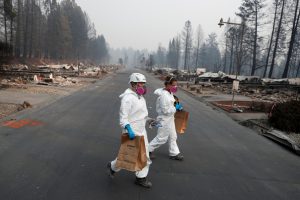
By Sharon Bernstein
SACRAMENTO, Calif. (Reuters) – PG&E Corp’s announcement that it will file for bankruptcy, citing massive potential liability from deadly wildfires, puts California politicians in quandary, whether to offer a bailout or risk allowing the state’s largest private utility to fail.
Governor Gavin Newsom, a Democrat, told reporters late on Monday his team was discussing the possibility of helping PG&E stay solvent, but no decisions had been made.
And lawmakers in the state legislature, who last year approved a bill making it easier for PG&E to bill ratepayers for the costs of wildfires sparked by its equipment in 2017, said that there was less support this year for extending additional financial assistance to the company.
“We would like to see it (bankruptcy) avoided, but we are not naive,” Newsom said. “I’m cognizant of the taxpayers, and I’m cognizant of the ratepayers, and I’m absolutely cognizant of those who lost everything.”

FILE PHOTO: Forensic anthropologists recover remains from a trailer home destroyed by the Camp Fire in Paradise, California, U.S., November 17, 2018. REUTERS/Terray Sylvester/File Photo
PG&E’s announcement on Monday that it intends to file for Chapter 11 bankruptcy protection as early as this month, citing potential liability exceeding $30 billion due to wildfires, came a day after its chief executive officer, Geisha Williams, was ousted from her post.
PG&E, which ranks as the largest U.S. power utility by the number of customers, supplies electricity to 40 percent of Californians. The state, Newsom said, is determined to keep service running to those customers.
But the utility’s power equipment has been linked to the ignition of more than a dozen wildfires in the past two years and is a suspected cause of the deadliest fire in state history, which swept through the town of Paradise in November, killing 86 people and destroying 90 percent of homes and businesses there.
Mark Toney, executive director of consumer advocate group the Utility Reform Network, said the atmosphere had cooled considerably toward PG&E in recent months, making a bailout politically more difficult for lawmakers.
“PG&E is going to have a much harder time because it doesn’t appear that they’ve learned any lessons,” Toney said.

FILE PHOTO: Statues are seen on a property damaged by the Camp Fire in Paradise, California, U.S. November 21, 2018. REUTERS/Elijah Nouvelage/File Photo
MIXED SIGNALS
The legislature and the governor could decide to allow PG&E to pass along the costs associated with victim lawsuits and other fire losses to ratepayers, as they did last year for a series of deadly northern California blazes in 2017.
Such legislation would also let utilities shift some future fire-related costs to consumers so long as regulators find no negligence on the companies’ part.
But state lawmakers have given mixed signals about what they might do about liability stemming from the deadly Camp Fire of November 2018 that incinerated most of Paradise.
Legislators representing areas devastated by wildfires have opposed any bailout for PG&E, saying its investors should absorb the costs – even if that means the company is bankrupted.
PG&E’s safety record has come under sharp scrutiny before.
State Senator Jerry Hill, whose district includes the site of the deadly 2010 San Bruno gas pipeline explosion determined to have been caused by PG&E’s criminal negligence said support for the utility was softer this year.
“I think there’s less chance, less thought of a bailout this year than we saw last year, certainly,” said Hill, who has the names of the nine people killed in the San Bruno blast framed in his office.
(Reporting by Sharon Bernstein in Sacramento, Calif.; Editing by Steve Gorman and Clarence Fernandez)
 The Cyprus central bank has declared that all banks in the nation will be closed through Thursday as measures are put in place connected to the nation’s bailout.
The Cyprus central bank has declared that all banks in the nation will be closed through Thursday as measures are put in place connected to the nation’s bailout.